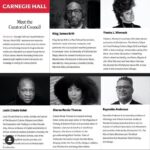Afrofuturism Is Celebrated in New York with an Epic Citywide Festival
Carnegie Hall is fueling an artistic awakening in New York celebrating Afrofuturistic expression that starts during Black History month and runs from February–March in spring 2022. They are curating a selection of Cultural organizations to present multidisciplinary programming that touches African diasporic philosophies, combining speculative fiction, mythology, comics, quantum physics, cosmology, technology, and more. A wide-ranging slate of offerings will include film screenings, exhibitions, and talks with leading thinkers and creatives in the Afrofuturistic realm. Ultimately, the Afrofuturism movement is about black social empowerment through technology and this festival aims to allow you to experience all of its incarnations. A wide-ranging slate of offerings will include film screenings, exhibitions, and talks with leading thinkers and creatives in the Afrofuturistic realm.
The Development of Afrofuturism in Modern Culture
The writings of writers Alondra Nelson and Mark Dery, who coined the term Afrofuturism in his 1993 essay “Black to the Future” in the South Atlantic Quarterly. These writings were a catalyst for more modern ideas around Afrofuturism. Dery describes it in this way, “…as African American signification that appropriates images of technology and a prosthetically enhanced future in the service of African American visions of things to come and a future that includes Black folk.”
Alondra expanded the idea through conversations and writings that further explored the concept. She said, “AfroFuturism has emerged as a term of convenience to describe analysis, criticism and cultural production that addresses the intersections between race and technology,” she wrote. “Neither a mantra nor a movement, AfroFuturism is a critical perspective that opens up inquiry into the many overlaps between technoculture and black diasporic histories.”
Adriaan Fuchs, Carnegie’s director of festivals and special projects said, “It is something which is kind of hard to explain in a certain way…but at the same time, it is something which one senses and knows as soon as you see it.” The festival is a way of exposing the concept to a wider audience in New York.
Afrofuturism mixes sci-fi and social justice
The curatorial council for the festival was led by artists and thinkers including King Britt, Ytasha L. Womack, Louis Chude-Sokei, Sheree Renée Thomas, Reynoldo Anderson. A group who have fueled the journey through space and time with their explorations of electronic music Black Sci-Fi culture and Astro Blackness. Many know Afrofuturism through jazz artists like Alice Coltrane, or the literary Black realities crafted by Octavia E. Butler or Ta-Nahasi Coates re-envisioning of the graphic novel Black Panther. But comic characters like Black Lightning, or Power Man (Luke Cage) were early embodiments of black power and empowerment who also impacted the culture and captured our imaginations as a youth. Music probably had the biggest impact on this mythos through visionaries like Sun Ra and Parlament Funkadelic, Afrika Bambaataa and later Detroit Techno artists like Juan Atkins who which took us on synthesized sound journeys through the tracks and electronic beats in their music. These electronic hits worked together with the ideas to make Afrofuturism more mainstream.
Afrofuturism’s preeminent sage was Sun Ra. His legal name was Herman Poole Blount and he was born in Birmingham, Alabama in 1914. This was the heart of Jim Crow South and it is understandable that he would seek other worlds to escape the harsh reality of the region where he was raised. Ra created a complex mystical and mythical artistic persona that fused sci-fi ideas and aesthetics with Egyptian iconography. The festival plays homage to indie Sci Fi film making influence of the movement that Sun Ra and John Coney captured with the film “Space Is the Place” (1974). This film features Ra playing his alter-ego, a seer from Saturn, whose mission is to relocate disenfranchised black youth to a utopia off-world. A slate of indie films will be showcased through out the festival.
Afrofuturism Lineup: Carnegie Hall’s 2022 Citywide Festival Lineup
“It is an extension of other explorations of programing involving Black artists that they’ve done in the past,” said Ytasha L. Womack, an author, filmmaker and dancer who is a member of Carnegie’s curatorial council for the festival. “But it also shows that they’re very much ahead of the curve in recognizing that Afrofuturism is a celebrated high art form.” Plans for the festival began in 2018 when Fuchs consulted writer Alondra Nelson and Mark Dery, who first used the term Afrofuturism in his 1993 essay “Black to the Future” in the South Atlantic Quarterly.
“Cultural theorists, public intellectuals and cultural workers, as we in the left used to call them, at the front lines of theorizing this emerging phenomenon, have taken issue, and rightly so, with the Americentricity of my vision,” Dery said, “for a more Afrodiasporic, pan-African understanding of Afrofuturism that bears in mind the legible impress of colonial horror, certainly all over Africa, but also elsewhere in Europe and so forth.”
Womack wrote the 2013 book: “Afrofuturism: The World of Black Sci-Fi and Fantasy Culture.” “I was thinking so much of people I had met were excited about ideas involving liberation, imagination, technology, mysticism and Black culture,” she said. “I felt obligated to write the book because I wanted people to find themselves in the book. I wanted them to realize that they weren’t alone. And I wanted them to feel that it was OK to think about Black culture and time and space, and to see that they were part of a larger trajectory of people.”
Events will take place at the Schomberg Center for Research in Black Culture, Harlem’s Studio Museum, Metropolitan Museum of Art, Juilliard School, National Sawdust and New York Film Academy. The Chicago-based Association for the Advancement of Creative Musicians provides an online component.
The concerts and events that the festival is showcasing will include the Sun Ra Arkestra with 97-year-old saxophonist Marshall Allen and guests Kelsey Lu and Moor Mother (Feb. 17), Nicole Mitchell and Angel Bat Dawid (Feb. 24), Chimurenga Renaissance and Fatoumata Diawara (March 4), the Carl Craig Synthesizer Ensemble (March 19) and Theo Croker (March 26).
“You really get the opportunity to take a deep dive into something and go and attend film screenings and hear musical performances and panel discussions and all sorts of different aspects of a specific subject,” Fuchs said. “It’s a wonderful tool, as well, for organizations to reach new young audiences and in a sense be part of something which sort of cuts through I think a lot of the cultural noise in New York City because there’s so much happening.”.

Flying Lotus
Grammy Award winner Steve Ellison better known as Flying Lotus or FlyLo, made his Carnegie Hall debut and opened the festival on Saturday, February 12. While Flying Lotus represents the next generation of Afrofuturistic performers he has a firm hold of the history, as well, since he is great grandnephew to the legendary Afrofuturistic pianist and harpist Alice Coltrane (wife of John Coltrane). His Grandmother was also a part of Detroit’s Motown disco roots in the 1970s creating disco reconstructions like Diana Ross’ 1976 hit “Love Hangover,” and Freda Payne’s “I Get High (On Your Memory),” McLeod also co-wrote Marvin Gaye’s “The World Is Rated X,” a classic funk track. Ellison mentions his early exposure to beat making at his childhood home in Detroit technology through her in an interview with Pitchfork, “She had synthesizers and a lot of drum machines: 808, 606, 303. She was always making music when I was a little kid. A couple times she would try to get me to sing on stuff but I was all shy and ran away.”
Other highlights of the festival include a performance by the creative visionary Carl Craig, he is a Grammy-nominated composer, Techno DJ, and founder of the seminal Detroit Techno record label Planet E Communications. He is an OG in the world of electronic music production and performance so don’t miss this performance. A common thread that runs through Craig’s broad musical catalogue is a resounding fascination with futurism, and this idea is embodied by the his recent Carl Craig Synthesizer Ensemble project. This two-month Afrofuturism festival, will include more than 80 events at the hall and partnering institutions that should not be missed.
Explore the artist who’s music shaped the sound of the movement as well as some who are playing in the festival in the playlist below.
Afrofuturism has roots in African American science fiction and encompasses literature, music and visual art exploring African American culture dating to slavery. And this festival will encapsulate elements of a movement that placed emphasis on Afro-diasporic artistic achievement and futuristic visions. Ultimately, the Afrofuturism movement is about black social empowerment through technology and this festival aims to allow you to experience many facets of the artform. Learn more about the Afrofuturism Festival via the website.
Explore and learn more about radio and Afrofuturism’s influence on the development of Techno in Detroit in our series called Detroit Techno 101. This is a companion to the upcoming feature film and partner project God Said Give Em’Drum Machines which is documenting the origins of the creation of Techno in Detroit and the history of Blacks in electronic music.

